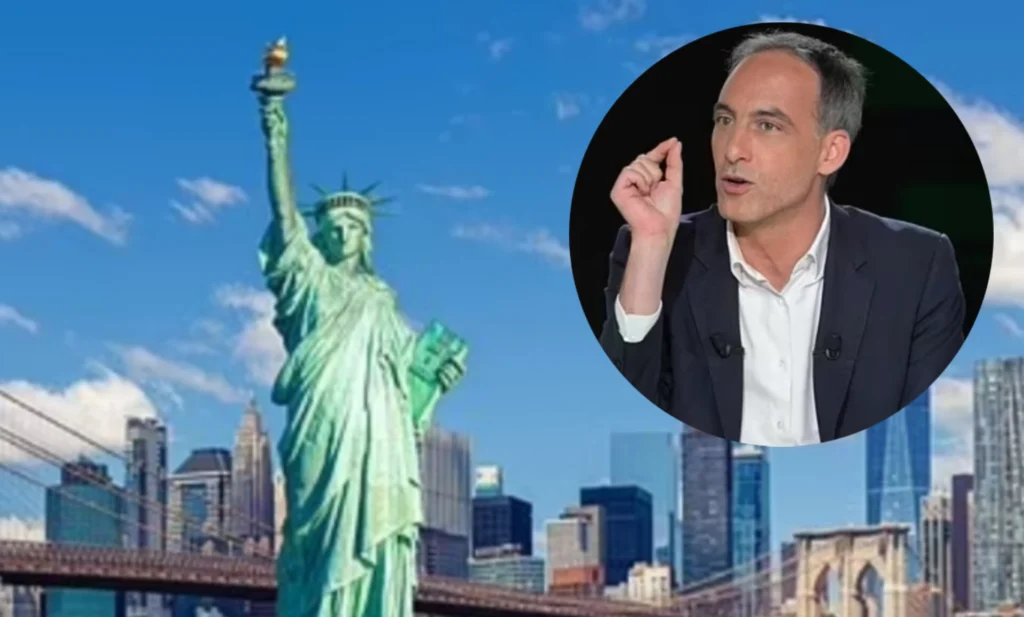Table of Contents

In a striking political development, French politician Raphaël Glucksmann, a Member of the European Parliament from the Socialist Party, has called on the United States to return the Statue of Liberty, which was gifted 140 years ago as a symbol of friendship between France and the United States. This demand comes in the context of harsh criticisms of former President Donald Trump’s positions, which were seen as “siding with tyrants.” This request reflects a growing sentiment in France, where concerns about the direction of American policy and its impact on democratic values are increasingly prominent.
Historical Background
The Statue of Liberty, gifted by France to the United States in 1884, is one of the most recognized symbols in the world, unveiled in New York in 1886. The statue embodies values of freedom and democracy and represents the historically close relationship between France and the United States. Since its inception, it has become a major tourist attraction, symbolizing hope and solidarity among peoples. More than a century later, the statue retains its symbolic stature, but Glucksmann’s call for its return indicates a growing strain in relations between the two countries.
Reason for the Call
During a recent party convention, Glucksmann expressed his discontent with Trump’s decision, which he characterized as “choosing to side with tyrants,” specifically referencing Trump’s stance on the Ukraine-Russia conflict. In his remarks, Glucksmann told the audience, “We say to the Americans who have chosen to side with tyrants: give us back the Statue of Liberty. You were given it as a gift, but apparently, you do not value it.” These statements come at a sensitive time, as European nations face increasing pressure to address security challenges posed by the ongoing war in Ukraine and the rise of authoritarian tendencies in certain countries.
European Reactions
Trump’s decision to suspend military funding to Ukraine has caused significant discontent among European nations. This move followed a tense meeting between Trump and Ukrainian President Volodymyr Zelensky, where the aim was to sign a deal allowing the U.S. access to Ukrainian resources in exchange for military aid. However, the meeting ended abruptly, with Trump criticizing Zelensky for not sufficiently appreciating the billions of dollars in assistance the U.S. had already provided. These events have prompted many observers to question the future of U.S.-Ukrainian relations and their impact on regional stability.
Glucksmann: Defender of Ukraine
Glucksmann is considered a strong advocate for Ukrainian issues, making this topic a top priority in his campaign for the 2024 elections. He is the son of a French philosopher and lived in Ukraine, where he worked as a revolutionary consultant, giving him a unique perspective on the situation there. By emphasizing the importance of supporting Ukraine against Russian aggression, Glucksmann aims to bolster European support for Ukraine, viewing this issue as a threat to the democratic values shared by the Western world.
Impact of Political Discourse
Glucksmann’s statements illustrate how political discourse can influence international relations, as his call represents a direct challenge to current American policy. These remarks may contribute to rising tensions between France and the United States, especially given the geopolitical circumstances that require close cooperation among allies. Additionally, this demand may open the floor for discussions on how to reassess historical relationships between nations and how to strengthen shared values in the face of current challenges.
Cultural Symbolism of the Statue of Liberty
The Statue of Liberty represents more than just a symbol; it embodies the democratic values and freedoms that many peoples around the world yearn for. The proposed return of this statue to France, as Glucksmann suggested, could be viewed as a reevaluation of historical relations between the two nations and reflects a growing discontent with American policies under previous leadership. This matter could influence how European nations perceive the United States and may encourage a reconsideration of how to build new alliances in the future.
You Might Like : St. Patrick’s Day 2025: A Celebration of Irish Identity and Culture
Common Challenges
The current geopolitical landscape necessitates greater cooperation among allied nations to address global challenges, such as security threats and climate change. Reevaluating relations between France and the United States could serve as a starting point for deeper collaboration across various sectors, including defense, security, and energy. By fostering dialogue and cooperation, both nations can work together to promote stability and peace in the world.
Glucksmann’s call for the return of the Statue of Liberty serves as a reminder of the complexities of international relations in times of crisis. Amid political tensions and changes in leadership, the question of how to restore trust among allies remains crucial, as does the ability of major powers to transcend their differences to uphold the values that ensure freedom and democracy for all.
